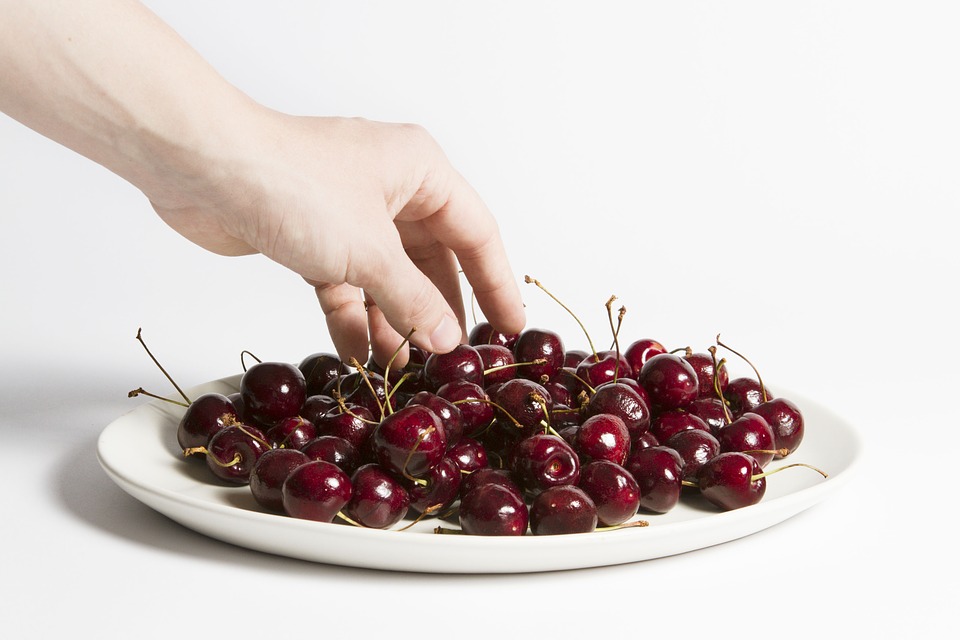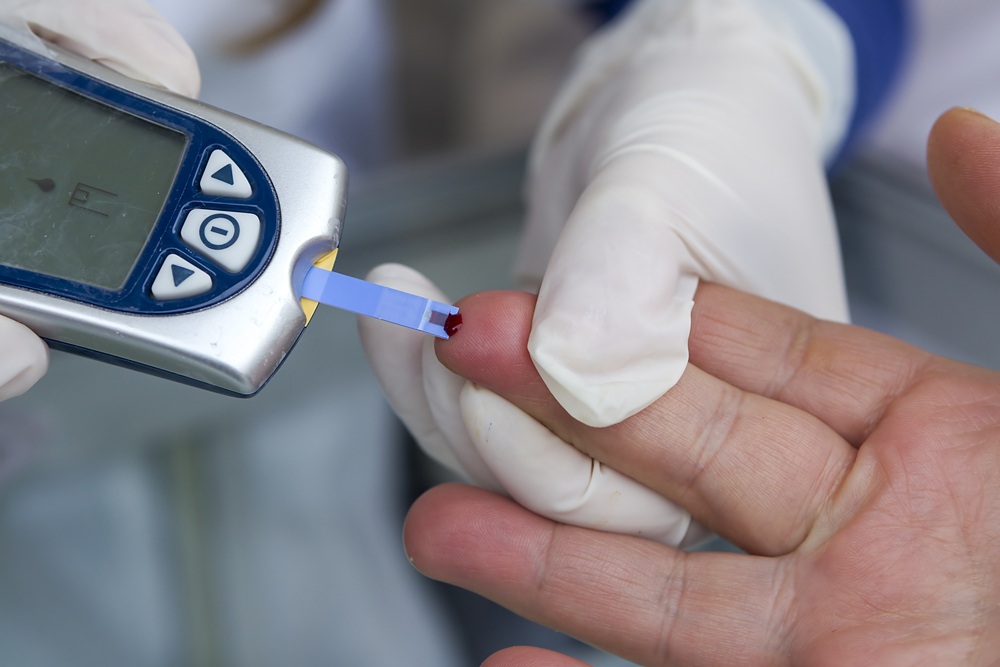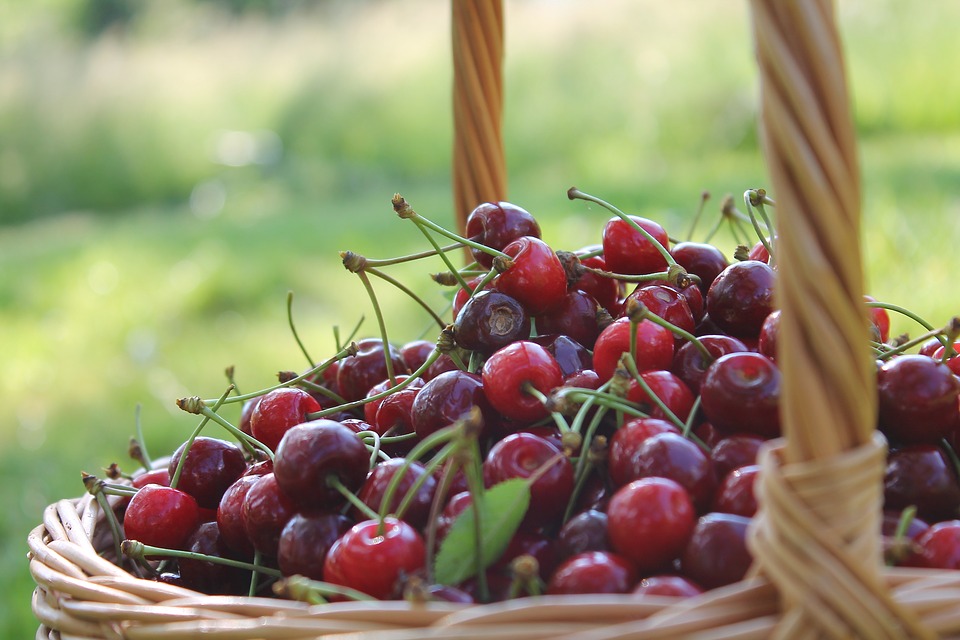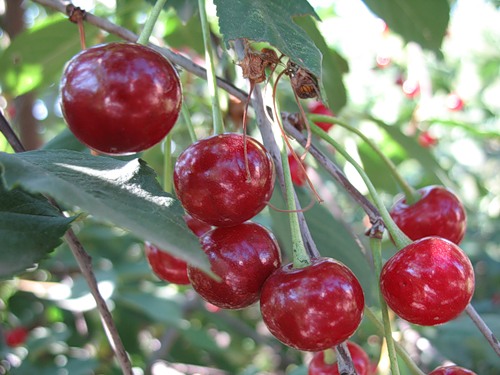Sweet cherries and cherries for diabetes mellitus: what berries can you eat? What berries can be used for diabetes?
Sick people with type 1 and 2 diabetes should not eat foods that are healthy. Because of this, for the patient, on an individual basis, the attending physician-dietitian compiles a diet for every day. Various berries are important for diabetes. It should be understood, however, that not all of them are useful for diabetics.
It is recommended to eat berries with diabetes, which have a small amount of carbohydrates, while rich in fiber, carotene and vitamins. It is also worth considering the glycemic index. There are fruits that contain high levels of carbohydrates in excess of a glycemic index of 70, and this is unacceptable in diabetes. The higher the index, the faster the glucose contained in the product enters the bloodstream.
Another great benefit of cherries during pregnancy, in addition to their vitamin and mineral content, is that they provide fiber that helps fight constipation and regulate intestinal transit, which can be helpful in preventing hemorrhoids during pregnancy. pregnancy.
ºº Cherries to improve athletic performance. Antioxidants have the ability to reduce oxidative damage that occurs at muscle levels and accelerate recovery from exercise. Something very exciting for athletes because it enhances their athletic performance.
In the diet of a diabetic, special attention should be paid to varieties of sour and sweet-sour berries, since the patient has problems with glycemia. The patient also needs to calculate the daily intake of carbohydrates.
So what kind of berries can patients with diabetes mellitus eat, and which ones should they refrain from?
Strawberry
When berries contain enough vitamins and do not greatly increase blood glucose, then they are especially useful. This berry includes strawberries. It contains many nutrients and vitamins (magnesium, vitamin C), which improve the functioning of the heart muscle and reduce the threat of arrhythmia. Due to the use of the contained dietary fiber, glucose decreases, and assistance is provided in the prevention of visual complications. Glycemic index 32.
º º Cherries for inflammation. One of the antioxidants that cherries contain, anthocyanins, are anti-inflammatory. This anti-inflammatory effect of cherries can be very beneficial for people with diseases that lead to inflammation such as gout, obesity, arthritis, etc.
The superfood is cherry. Yes, even though they are so small in their content, they have countless vitamins and minerals that make it one of the healthiest fruits on the planet. The benefits of cherries seem to be unlimited.
Cherry
The most popular berry for a diabetic patient. There is a small amount of carbohydrates and enough nutrients that have a beneficial effect on the health of the whole organism. The composition of the berry has coumarin, it does not allow the appearance of blood clots, which disturb diabetics with atherosclerosis.
Cherries are rich in antioxidants - they fight cancer and heart disease. Anthocyanin - promotes the production of its own insulin. You can include fresh or frozen cherries in the diet. Glycemic index 22.
If we add to this that they contain Various types antioxidants, even those that are not as abundant as anthocyanins. They turn it into a superperfood with which we begin to describe this fruit. We must take advantage of it when it is time for our body both inside and outside.
And that's why you should include it in your daily diet without any remorse. Being so healthy and nutritious, it can be consumed by children, adults and seniors. The latter may be susceptible to some of the symptoms of different age-related diseases.
Raspberries

Raspberry refers to sweet berry, therefore, it must be used with caution, following the recommendations of the attending physician. Raspberries are good for the heart. It contains a lot of antioxidants that prolong youth. It inhibits the aging of the body, replenishes the immune system with vitamin reserves. Glycemic index 30.
To find out all the properties and benefits of cherries, we have prepared this post. We're going to tell you all about this fruit, and from now on, you always have cherries as part of your daily menu. This is the main property of cherries. It contains many antioxidants that are unlikely to be found in other types of fruits.
Despite its size, the concentration it contains is so high that its effect is achieved very quickly. Among the antioxidants found in cherries are flavonoids, which are some of the strongest that exist and offer many health benefits. Because it helps the heart, kidneys, liver, skin and so on.
Gooseberry
The benefits of using gooseberries are that the body is cleansed, the work of the gastrointestinal tract is improved. You can eat gooseberries for people who monitor their weight. Gooseberries help replenish chromium stores, so the pancreas produces its own insulin. Since gooseberries are low in fructose, you can eat them as much as you want. It is important to consume gooseberries at the initial stage of the development of the disease. Glycemic index 40.
Cherries also fight inflammation that can occur in the body. Especially internal, the reason why he fights pains that can provoke arthritis. You will also forget about ulcers and gastritis. Cherries have a decent amount of fiber. This way, you will regulate the entire digestion process and you will not have to worry about constipation.
Vitamins and minerals present in cherries
If you already suffer from it, consuming it will often allow you to evacuate regularly. Your gut will thank you. Vitamin A especially beta-carotene Vitamin B, C and E Iron Potassium Calcium Magnesium Phosphorus.
Reduce gout pain
Because of its anti-inflammatory properties, cherries allow the pain caused by gout to be less severe, and in some cases they do not appear. This makes it easier for people with this condition.Currant
Thanks to currants, the condition of the vessels improves, their walls are strengthened, the blood is cleared of cholesterol. The berry contains vitamin C in large quantities, which helps to protect the body from colds. In addition to currants, decoctions from its leaves are beneficial. Glycemic index 30 - red currant, 15 - black.
According to one study, regular consumption of cherries prevents these attacks by 35%, which is certainly good news for patients suffering from this disease, which is very difficult to tolerate. Because pain interferes with the normal development of their work, even sleep.
Protects the cardiovascular system

Thanks to the presence of anthocyanins, a powerful antioxidant that consumes cherries allows cardio function. The pumping blood is much cleaner, without fat and arteries will not be covered. Blood pressure will drop, which is good news for hypertensive patients.
Sea buckthorn

Sea buckthorn is very rich in vitamins, indispensable for diabetics. It has a preventive effect against complications of this disease, regenerates and restores tissues. Improves the skin. The fruits are useful raw or for fruit drinks. Glycemic index 30.
It also has melatonin, another antioxidant that controls heart rate, so you don't suffer from arrhythmias. Another function is to monitor your sleep cycle, so if you have trouble falling asleep or even waking up at dawn. Prepare a stalk infusion or use it regularly to help you manage this problem.
Prevents cancer progression
Once you have successfully rested, your cardiovascular system will not be needed. The rest is overestimated by many people, but it has consequences in many organs, including their heart. Some recent studies have also concluded that the presence of anthocyanin in the body prevents cancer from developing faster. Especially if the person regularly undergoes treatment.
Cherries
With diabetes, cherries can be consumed, but with some remarks. The cherry contains a small amount of carbohydrates, it has a low glycemic index of 25. The composition of the berry is dominated by antioxidants, which prevent the risk of heart disease and cancer. Canned cherries cannot be eaten in compotes. In this case, it can be frozen and raw.
Cherries also have ellagic acid, which is one that fights against the onset of tumors. With antioxidants that fight free radicals, your skin will look its best. It will be smooth and smooth so you don't have to worry about premature aging wrinkles.
Also much brighter, you will feel "alive". You will notice the changes immediately. ![]()
As discussed above in the properties, frequent consumption of cherries will allow your intestines to function properly. Constipation won't be a problem because you will have the right amount of fiber.
Sweet cherry is contraindicated in patients who have high acidity in the stomach, ulceration, lung disease, obesity.
For a diabetic patient, sweet cherries are as beneficial as they can get by injecting insulin or taking sugar-lowering drugs. It is allowed to consume no more than 100 grams per day.
Grape
Very juicy berry... Since diabetics should reduce their intake of foods containing a high rate of carbohydrates, in type 2 diabetes, they should be avoided altogether.
You can not eat fresh grapes for patients with diabetes, but use raisins in fruit drinks and compotes, eat dried berries, 3 pieces 1 time for several days. Glycemic index 40.
Prevents the onset of anemia
It will also avoid many diseases associated with malfunctioning of the digestive system. Because of its high iron and folate content, tart cherries help raise your hemoglobin levels, so you don't get anemic. It is ideal for pregnant women or in the process breastfeeding must consume it to prevent anemia.
When you have high hemoglobin, you will feel more energized and also have a relationship with your mood. Since cherries have very low cholesterol levels, you will have much cleaner blood. It also has no fat, so you can control uric acid, which also affects gout symptoms.
Allowed and forbidden for diabetics

A subcaloric diet for patients with type 2 diabetes has a peculiarity: you need to add a complex intake of vitamins. Many of them are found in berries. Then which ones are beneficial and can be included in the diet for type 2 diabetes?
Cherries contain tryptophan, which is a substance that helps the segregation of serotonin, the essence of happiness. Being in a higher percentage in our blood will make you feel much better in your state of mind and prevent the onset of depression.
Surely you've come to this article looking for one of the best cherry benefits when looking to get in shape. Cherry in its composition is mainly water, it is low in calories, so it does not feed people who often consume it. So feel free to include it as an addition to your breakfast or as an after-dinner dessert.
Since each berry contains a different amount of fiber, vitamins, glucose, fructose, they are divided (useful and prohibited) for use in type 2 diabetes.
It is allowed to enrich the diet with the following berries:
- Cherry;
- gooseberry;
- raspberries;
What berries should you not eat? Those that contain significant amounts of fructose, which is dangerous. It is allowed to include in the diet for type 2 diabetes only in dried form, moreover, they should be provided in a subcaloric diet.
It's also a great snack choice, especially in the afternoon when it always brings out something sweet. There will be no remorse here. People looking to lose weight can also use cherries as one of these fruits in their diet. Thanks to antioxidants and fiber, you can lose those very annoying pounds. Of course, this must be accompanied by exercise and a healthy diet to achieve your goals.
Undoubtedly one of the best benefits of cherries is that it helps control blood sugar levels. Cherries are ideal fruit for people with diabetes. This is far from what many might think. Of course, you must be surprised. We know this is very cute, but it doesn't translate into much fructose in its content.
These include:
- grape;
- peach;
- apricot.
Diabetes mellitus is a treatable disease. A properly formulated diet and adherence to the doctor's recommendations will help to overcome this ailment.
Diabetes mellitus imposes serious restrictions on the patient's diet. The ban includes foods high in simple carbohydrates. A patient with type 1 and type 2 diabetes should not eat most fruits and berries, but it is necessary to explain what is safe for diabetics.
Regenerate muscles faster
And if you are one of those looking to increase muscle mass, then this cherry benefit would interest you. For people who go to the gym or enjoy exercising daily, cherries allow for much faster muscle recovery when consumed on a regular basis. This is because it contains a lot of potassium.
Antioxidants are also linked to faster muscle recovery, as it eliminates the much faster oxidative stress that is created in the body by the efforts made after a hard workout. 
Last but not least, from our list of the best cherry benefits, it helps in hydrating the body.
It should be noted that with diabetes of both types, it is strictly forbidden to use grapes of all varieties due to the high concentration of sugar in the latter. For other berries, there are no such strict restrictions.
- Strawberry. This berry contains a small amount of fast carbohydrates and is well indicated for consumption in small quantities. The energy value of strawberries is as follows: 11 g of carbohydrates per 100 g of product. In addition, strawberries are a source of vitamin "C", many minerals, and trace elements - manganese, folic acid, etc. It is believed that the safe daily intake of strawberries is about 200 g;
- Black currants are also safe for diabetes. This variety of currants will satisfy the body's need for iron, potassium, phosphorus. Concentrated in black currant a large number of vitamin "C", therefore, to replenish its reserves per day, it is enough to eat 50 g of this berry;
- Blueberries will help diversify the diabetic's menu due to the bright taste coupled with a moderate sugar content. The berry contains tannins, glycosides, and minerals. The beneficial effect of the berry on the organs of vision can hardly be overestimated in diabetes mellitus - blueberries are used as part of a complex for the prevention of diabetic retinopathy;

A healthy diet for diabetics doesn't have to remove everything delicious food from your plate. The key so that you can eat everything without hurting your health is moderation. Diets made for people with diabetes tend to exclude fruits because of fructose, the natural sugar they contain. However, you can continue to enjoy your favorite fruits as you learn to consume controlled rations and alternate varieties that can provide you with different benefits.
What are the most suitable fruits for diabetics? Among the many fruits that we can consume, there are some that are very beneficial for diabetics because of their nutrients and properties. For example, an apple offers a fiber called pectin, which helps control glycemia in addition to lowering cholesterol levels. An apple and cinnamon pairing is a great choice to get rid of your cravings for sugary foods and prolong the feeling of fullness.
- Raspberries: Despite their seemingly excessive sweetness, raspberries have a low glycemic index and are suitable for diabetic patients for moderate consumption.
Cherries and cherries for diabetes
These berries stand alone in dietary menu diabetics, because they are safe to eat and have a wide range of benefits.
Avocados offer a small amount of sugar, making this fruit a good alternative for diabetics. It is a source of healthy fats that slows down the absorption of food, prolonging the feeling of fullness, like an apple. The only drawback is that avocado is a very charming fruit that should be consumed in a controlled manner, even more due to overweight people.
Little cherries can also be great allies for people living with diabetes. Its red color condemns the presence of flavonoids, a powerful antioxidant, anti-inflammatory, antiviral, anti-allergic and cancer-fighter. Cherries also offer vitamins A, C, and E, which are combined to prevent damage caused by free radicals, substances that damage healthy cells in the body.
Cherry
Cherries are good because they are very affordable and can grow directly on personal plots in different climatic zones - so you can either buy cherries very cheaply or grow berries yourself. Here is a list of useful substances contained in cherries: chromium, magnesium, fluorine, vitamins of the "B" group, vitamin "C", tannins, iron, cobalt, pectins, calcium, vitamin "A".
It should be noted that coumarin plays an important role in the beneficial effect of cherries on the body. This substance resists the formation of blood clots, perfectly thinning the blood. Eating cherries helps prevent atherosclerosis and hypertension (cherries are good at lowering blood pressure). The consumption of cherries promotes the elimination of toxins, toxins and excess salts from the body: therefore, nutritionists advise people living in areas with an unfavorable ecological environment to eat this berry. With all the diversity useful properties Do not eat too much cherries for type 2 diabetes. The berry is not recommended for diabetics with high stomach acidity, stomach ulcers and acute colitis.

The glycemic index of cherries is 22, so eating even ripe and sweet-tasting berries will not lead to a sharp rise in blood sugar. Fresh berries have a low calorie content - only 87 kcal, so cherries with diabetes can be eaten by those patients who are obese. Cherries are best eaten throughout the day in portions; it is important to ensure that the total number of berries eaten for knocking does not exceed 300 g. Cherry berries are suitable for a diabetic for making tea or compote; cherries can be used to make a special dietary jam and use it, for example, as a filler for baking. Diabetics should not buy processed cherry products in stores, as in most cases they contain sweeteners and flavor enhancers.
Cherries
The berry is very sweet, so diabetics ask themselves the question: how safe can you eat cherries with diabetes? Cherries are suitable for diet food in any form: fresh or frozen berries, jelly, jam, drinks. However, as is the case with cherries, it is better to abandon the processed products of this berry. Like cherries, sweet cherries are a storehouse of useful substances: they contain B vitamins, vitamin C, cobalt, manganese, copper, calcium, phosphorus, iron, iodine, pectin, flavonoids, and malic acid. Similar to cherries, sweet cherries contain coumarin, the beneficial effects of which are described above (can only be supplemented by the fact that cherries more actively contribute to the process of hematopoiesis). The carotenoids that make up the berry help to improve the functioning of the cardiovascular system and prevent the formation of cholesterol plaques. Cherry has a strong diuretic effect, therefore it is indicated for obese diabetics. Cherry perfectly satisfies the feeling of hunger, so you can eat a few berries before the main meal - the feeling of fullness will come faster and this will help to avoid overeating.

Information about energy value cherries (per 100 g):
- proteins - 1.1 g;
- fats - 0.1 g;
- carbohydrates - 10.6 g;
- calorie content - 52 calories;
- glycemic index - 22.
100 g of berries contain 17% of daily allowance vitamin "C". Also, cherries easily replenish the body's daily need for potassium, which in 100 g of berries contains 233 mg.
Eating cherries has a beneficial effect on the functional state of the pancreas. It is believed that the high concentration of anthocyanins in the product improves the insulin generation process to some extent. Anthocyanins are found only in red cherries, yellow berries for medicinal purposes are useless for diabetics. Of the sugars, sweet cherries contain fructose, moderate consumption of which is allowed for diabetics.
Regular consumption of berries in food will help improve the appearance - cherries actively nourish the skin, improving complexion and skin texture, and replenishing collagen reserves. Cherry is indicated as a component of dietary nutrition for diseases of the ligaments and joints, which impair their elasticity. Diabetics in adulthood and old age should consume cherries to prevent diabetic neuropathy - a disease that causes one of the most dangerous complications of diabetes mellitus - diabetic foot. Due to the laxative effect, cherries need to be eaten periodically to cleanse the gastrointestinal tract.
As for the rate of consumption of berries, it must be remembered that a diabetic should not be allowed more than 100 g of fresh berries per day. Early varieties are best consumed unprocessed. Thermally processed cherries lose most of their useful properties. The low value of the glycemic index allows you to consume more cherries than other berries, however, uncontrolled eating is not encouraged due to the possible exacerbation of problems in the stomach. Also, sweet cherry is contraindicated during the period of escalation of pulmonary pathologies. More seriously, you need to limit the consumption of processed cherry products - syrups, preserves, jams.









